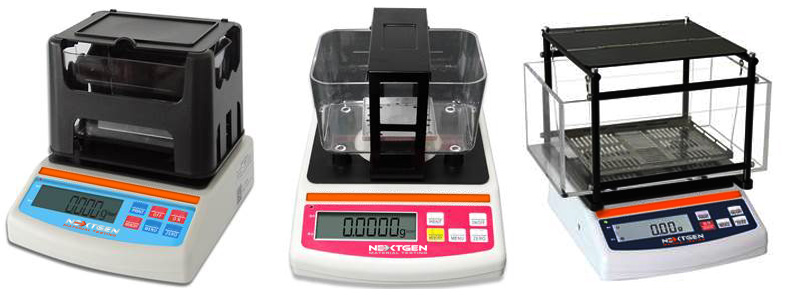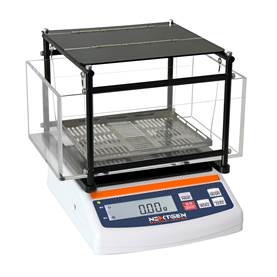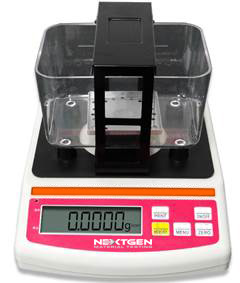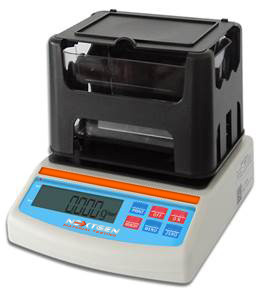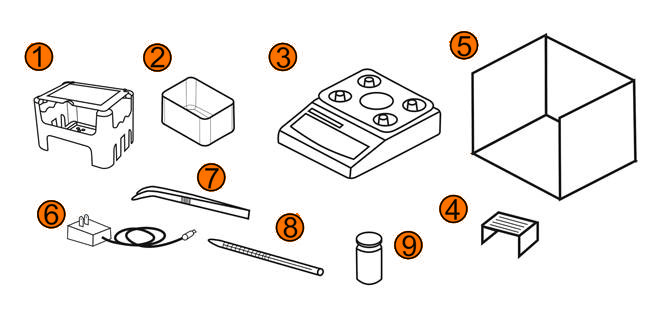Rubber Testing Equipment
Standards
ASTM D792, ISO 2781, ISO 1183, GB/T1033, GB/T2951, JIS K6268, GB/T208, GB/T5163, GB/T 1933






Description
The NG-DM-A Series offers high-accuracy digital Densimeters designed for a wide variety of material testing needs. These elegant and compact densimeter systems offer capacity ranges from 150g to 3000g with accuracy of 0.001g/cm3 down to 0.0002g/cm3.
Densimeter Application:
The densimeter is suitable for rubber, plastic, tire, shoe materials, macromolecule, composite materials, elastic materials, conveyer belt, transmission belt, soft synthetic leather, leather, and much more. The digital Densimeter systems are upgraded multi-function density measurement instruments that had undergone and extensive researched and developed phase for optimal test results. The density meter systems offer instant density reading values. They additional provide the abrasion loss of relative volume for DIN, ARI, AKRON. Expansion rate, quality and volume change rates can also be displayed. These Densimeters have been commonly used in virtually all rubber testing facilities.
Digital Densimeter System Features & Functions:
- Density precision: 0.001 OR 0.0001g/cm3
- Value Displays: Apparent density, volume, mixture ratio, density and volume change rate
- Power Supply: AC 100V-240V 50HZ/60HZ North American and European standards
- PC and printer connection via RS-232 port. This allows to print measuring data.
- High accuracy, simple operation, and fast results meet laboratory operation standard and quick cycle testing requirement for all types of testing facilities
- Function of 10 group data storage for density value and DIN volume abrasion loss.
- In accordance with DIN 53516 standard. Offers the function of calculating average value for multigroup data.
- Either water or other liquids can be used as medium. The medium temperature can be set from 0℃ to 49℃ and the medium density can be set to 19.999.
- Function of waterproof medium density setting, aerostatic buoyancy compensation setting.
- Function of weight loss value setting, fixed weight loss value setting, density setting for reference rubber.
- As for new materials in research and developing, the percentage content of main material for two mixed objects can be displayed
- Auto max. and min. limitation settings for sample qualifications indicated by an alarm
- Function of automatic zero tracking, buzzer warning, and overload warning.
- Large tank design can decrease the inaccuracy caused by supporting wire's buoyancy.
- High capacity injection moulding PC water tank, designed to resist wear, falls, and corrosion.
- Special windproof and dustproof cover designed to make the structure more convenient and durable.
- Ability to measure density of any rubber and plastic products with any shape.
- Injection moulding testing plate and the high transparency water sink is built-in imported PC. Testers can clearly inspect the samples in water.
- The suspension wire made up of 0.5 mm stainless steel is perpendicular to nacelle, which does not touch the water sink, therefore ensuring the accuracy of the test results.
Densimeter Technical Specifications
| Model | NG-DM-A300 | NG-DM-A600 | NG-DM-A1200 | NG-DM-A3000 | NG-DM-A150 | |
|---|---|---|---|---|---|---|
| The maximum weight(g) | 300g | 600g | 1200g | 3000g | 150g | |
| Density precision(g/cm3) | 0.001g/cm3 | 0.0002g/cm3 | ||||
| Repeatability accuracy | ±0.001g/cm3 | ±0.0003g/cm3 | ||||
| Measurable Parameters | Density, Specific gravity, Mixing ratio, Volume | |||||
| Measurable Samples | Solid, Pellet, Film, Floating samples, etc. | |||||
| Density range | >1,<1 both can be measured | |||||
| Mixing ratio setting | S1 - S2(Set different values to measure the mixing ratio,content of different mixture, alloy by,) | |||||
| Other parameters setting | Temperature compensation, air buoyancy compensation, standard block weight, density, the upper and lower limits of specific gravity | |||||
| Functional Mode | Solid Mode | Can measure the density, specific gravity, volume value of solid, granular, floating objects, colloid | ||||
| Mixing Ratio Mode: | Can measure either of the material mixture ratio, content for the known density of two materials mixture | |||||
| Settings of Temperature and Solution Compensation | The solution density can be set to 19.999 | |||||
| Density setting of HI and LO limit |
It can set the high limit and low limit of density | |||||
| Output mode | RS-232C | |||||
| Temperature And Humidity Range | Allowable ambient temperature:-18℃-45℃ Allowable relative humidity: Less than 80% | |||||
| Power Supply | European standard AC 100V-240V | |||||
| Other parameters | Overall size: 395x195x330mm (15.55x7.7x13-inch) Product size: 210x195x185mm (8.3x7.7x7.3-inch) |
|||||
Standard Densimeter Accessories:

- Measuring platform
- Water tank
- Main-body
- Anti-floating frame
- Windshield (Optional Configuration)
- AC adapter
- Tweezers
- Thermometer
- Calibration weight
FAQs
ASTM D792 is a standard test method for the density and specific gravity of plastics by displacement. This test method outlines procedures for determining solid plastics' density and specific gravity in forms such as sheets, rods, tubes, or moulded items. The method involves the measurement of the mass and volume of a test specimen and then calculating its density and specific gravity. It helps ensure that the density and specific gravity values reported for plastic materials are accurate and reliable, making it easier to compare different materials and identify potential properties variations.
To comply with ASTM D792, the equipment used for measuring the density and specific gravity of plastics must have accuracy and precision and be calibrated regularly to ensure reliable results.
NextGen Digital Densimeter Systems comply with ASTM D792 standard.
Click here to learn more about the product or here to receive a personalized quote.
ISO 2781 is an international standard that specifies a method for determining the density of solid materials by the hydrostatic weighing method. It outlines the procedures for determining the density of both regular and irregular-shaped objects, including powders and granular materials.
NextGen's Digital Densimeter Systems are specifically designed to measure the density of solid materials using the hydrostatic weighing method, which complies with ISO 2781. ISO 2781 is commonly used in the plastics industry to ensure quality control of plastic materials and in research and development to characterize new materials. Compliance with this standard is important for companies involved in producing, processing, and using plastic materials, as it ensures the accuracy and consistency of density measurements.
NextGen Digital Densimeter Systems comply with ISO 2781 Standard.
Click here to learn more about the product or here to receive a personalized quote.
ISO 1183 is an international standard that defines the methods for determining the density of solid plastics. The standard specifies the general procedures to be used for the determination of the density of both solid and cellular plastics using displacement or immersion methods. The standard is widely used in the rubber industry to ensure that the materials used meet certain quality and performance requirements.
NextGen Digital Densimeter Systems comply with ISO 1183 standard. The systems use the displacement method, which involves measuring the volume of a test sample and then dividing it by its weight.
What are the advantages? NextGen Digital Densimeter Systems are fully automated, which reduces the risk of errors and ensures consistent results. Moreover, they provide measurements within a few minutes. Additionally, the systems require very little sample preparation, making them ideal for use in high-throughput applications.
Click here to learn more about the product or here to receive a personalized quote.
GB/T1033 is a Chinese national standard that specifies the methods for determining the density of solid plastics in various forms, including moulded articles, sheets, and films. It is a critical quality control parameter for plastic manufacturers as it affects the performance and properties of plastic products. The standard outlines various procedures for sample preparation, such as the selection of sample size, the method of cleaning the sample, and the removal of surface moisture. The standard also provides guidance on how to determine the density of materials with varying shapes and sizes. The displacement method is one of the most commonly used methods for determining the density of plastics & rubber.
GB/T 1033 recommends using pycnometers, hydrostatic balances, and density meters to measure the density of liquids and solids. The standard provides specific requirements and test procedures for each of these instruments to ensure accurate measurements.
NextGen Digital Densimeter Systems comply with GB/T1033 standard.
Click here to learn more about the product or here to receive a personalized quote.
NextGen Digital Densimeter Systems are designed to test rubber, plastic, tire, shoe materials, macromolecule, composite materials, elastic materials, conveyer belt, transmission belt, soft synthetic leather, leather and many other materials.
GB/T 2951 is a Chinese national standard that specifies the methods of testing the insulation and sheath of electric cables and optical cables. The standard is equivalent to the international standard IEC 60811-1-1.
GB/T 2951 specifies the procedures for determining the insulation and sheath thickness, tensile strength, elongation at break, aging, hot set, heat shock, and other relevant properties of electric cables and optical cables. It deifnes the test conditions, sample preparation, and measurement techniques required to carry out these tests, as well.
The GB/T 2951 standard is important for ensuring the safety and reliability of electric cables and optical cables used in various industries, including telecommunications, power transmission, and construction.
NextGen Digital Densimeter Systems comply with GB/T2951 standard.
Click here to learn more about the product or here to receive a personalized quote.
JIS K6268 is a Japanese industrial standard that outlines the method for determining the density of solid plastic materials. It specifies using a hydrostatic method to determine the density of plastics. The method involves weighing a specimen of known volume in air, immersing it in water, and weighing it again. The difference in weight is used to calculate the density of the plastic specimen.
NextGen Digital Densimeter Systems are designed to measure the density of various solid materials, including plastic. Our systems are equipped with a precision balance and a sample holder that allows the user to measure the mass and volume of the sample accurately. The system then calculates the density of the sample using the mass and volume measurements.
NextGen Digital Densimeter Systems comply with the JIS K6268 standard because they are designed to measure the density of solid plastic materials using a hydrostatic method. The systems are equipped with the necessary tools and instruments to accurately measure the density of plastic materials, complying with the JIS K6268 standard.
Click here to learn more about the product or here to receive a personalized quote.
GB/T208 is a Chinese national standard that specifies the method for testing the density of solid materials. The standard outlines the procedure for measuring the density of materials using the displacement method. This involves measuring the volume of the displaced liquid when the sample is submerged in a liquid of known density.
NextGen Digital Densimeter Systems are designed to measure the density of solid materials using various methods, including but not limited to the displacement method. Our systems are equipped with advanced features such as temperature control, automatic calculation of density, and data storage capabilities.
NextGen Material Testing Digital Densimeter Systems meet the compliance requirements according to GB/T208. The systems are designed and calibrated to provide accurate density measurements in accordance with the standard's testing procedure. Moreover, the company conducts rigorous testing and quality control measures to ensure the reliability and accuracy of its products.
Click here to learn more about the product or here to receive a personalized quote.
GB/T5163 is the Chinese national standard for "Test methods for specific gravity of plastics." It specifies the procedures for determining the specific gravity of plastics using various methods, such as hydrostatic and densimeter methods.
NextGen Digital Densimeter Systems are designed to measure the density of materials, including plastics, complying with various international standards. Our Digital Densimeter Systems use the hydrostatic weighing method to accurately determine a sample's density, a widely accepted technique for determining specific gravity.
NextGen Digital Densimeter Systems are super accurate, which makes them suitable for use in industries that require precise measurements, such as plastics manufacturing, automotive, and aerospace. The digital densimeter systems are easy to operate.
NextGen Material Testing Digital Densimeter Systems comply with GB/T5163 and several other international standards, making them a reliable choice for businesses seeking accurate density measurements.
Click here to learn more about the product or here to receive a personalized quote.
GB/T 1933 is a standard used in China to specify the methods for determining the density of solid plastics. It is applicable to solid plastics in the form of a block, sheet, rod, tube, or other shapes. This standard describes three methods for measuring the density of solid plastics: the water displacement method, the liquid pycnometer method, and the gas comparison pycnometer method.
NextGen’s Digital Densimeter Systems are upgraded multi-function density measurement instruments that had undergone and extensive researched and developed phase for optimal test results.
NextGen Digital Densimeter Systems are specifically designed to measure the density of various materials, including solid plastics. NextGen Digital Densimeter Systems do comply with the GB/T 1933 standard. These systems are designed to meet various international standards, including the ones used in China, ensuring that they provide accurate density measurements for solid plastics.
Click here to learn more about the product or here to receive a personalized quote.
The NextGen Digital Densimeter Systems work on Archimedes' principle, which states that the upward buoyant force exerted on an object immersed in a fluid equals the weight of the fluid displaced by the object. In other words, the densimeter measures the weight of an object in air, and then in liquid, and by comparing the two values, it determines the density of the liquid.
The densimeter consists of a balance beam with a sample holder on one end and a reference weight on the other. The sample holder can be filled with the liquid whose density is to be measured. The balance beam is then immersed in a container filled with a reference liquid of known density, usually water. The densimeter takes the weight of the sample in air, and then it is immersed in the reference liquid. The weight reading changes as the buoyant force on the sample changes. The densimeter then calculates the density of the sample by comparing the two readings.
Click here to learn more about the product or here to receive a personalized quote.
NextGen Digital densimeter systems have numerous applications in different industries, thanks to their precision and accuracy in measuring the density of liquids and solids. Here are 5 key applications of these systems:
- Quality Control: The digital densimeter systems are used to ensure that the density of products falls within acceptable limits in industries such as pharmaceuticals, food and beverages, and chemicals. These systems help maintain the consistency and quality of the products.
- Material Testing: Digital densimeter systems are used in material testing, measuring the density of plastics & rubber. This helps in evaluating the quality of the materials.
- Research and Development: Digital densimeter systems are used to measure the density of new materials and compounds, helping researchers determine the physical properties of the materials and their potential applications.
- Petroleum Industry: Digital densimeter systems are widely used in the petroleum industry to measure the density of crude oil and other petroleum products.
- Environmental Monitoring: Digital densimeter systems are also used in environmental monitoring, where they help measure the density of soil, water, and air samples.
Click here to learn more about the product or here to receive a personalized quote.
- High accuracy and precision: NextGen Digital Densimeter Systems provide high accuracy and precision in density measurement with a resolution of up to 0.0001 g/cm³.
- Multiple measurement modes: NextGen Digital Densimeter Systems offer multiple measurement modes, including standard mode, rapid mode, and continuous mode, to suit different types of samples and measurement requirements.
- Easy to use: The Digital Densimeter Systems are easy to operate with a user-friendly interface and intuitive software. Our systems have a built-in temperature control system to ensure accurate measurements.
- Automatic calibration: The Digital Densimeter systems feature an automatic calibration function, ensuring accuracy and eliminating the need for manual calibration.
- Wide range of sample sizes and types: NextGen Digital Densimeter Systems can accommodate a wide range of sample sizes and types, including powders, granules, solids, and liquids.
- Automatic temperature compensation: The systems feature automatic temperature compensation, which ensures accurate density measurements over a wide range of temperatures.
- Data storage and analysis: The systems can store and analyze a large amount of data, allowing users to easily retrieve and analyze previous measurements.
Click here to learn more about the product or here to receive a personalized quote.
NextGen Material Testing Digital Densimeter Systems measure density by the buoyancy method, also known as Archimedes' principle. The weight of an object in a fluid is reduced by an amount equal to the weight of the fluid displaced by the object. This principle is used to determine the density of solids and liquids.
A sample of the material is placed in a measuring cell. The measuring cell is then immersed in a fluid of known density, typically water or air, and the system measures the weight of the sample in the fluid. Based on the measured weight and the known density of the fluid, the system calculates the density of the sample.
NextGen's Digital Densimeter system is highly accurate and can measure densities with a precision of up to four decimal places. The process is automated and easy to use.
You can order a Digital Densimeter System with additional features like temperature control, automatic liquid dispensing, and measurement of other physical properties such as refractive index and viscosity.
Click here to learn more about the product or here to receive a personalized quote.
The accuracy of NextGen's Digital Densimeter Systems varies depending on the model and the type of material being measured.
The system's accuracy is affected by various factors, such as the sample size, temperature, viscosity, and the presence of any air bubbles in the sample. Samples must be prepared and handled carefully to ensure the most accurate measurements, following the measurement procedure closely.
The typical accuracy of the Digital Densimeter Systems ranges from 0.001 g/cm³ to 0.0001 g/cm³, with a repeatability of 0.0001 g/cm³ to 0.00001 g/cm³. This accuracy level is achieved through advanced measurement technologies, such as oscillating U-tube and the Archimedean buoyancy method.
Furthermore, at NextGen Material Testing, we adhere to strong quality control processes to ensure that our Digital Densimeter Systems fulfill the necessary accuracy criteria. We also offer calibration and verification services to ensure that their equipment is accurate.
Click here to learn more about the product or here to receive a personalized quote.
The precision of the instrument's components, the stability of the measuring environment, and the operator's skill all impact the repeatability of a digital densimeter. Digital densimeters provide automatic measurement and data processing capabilities that limit the risk of human mistakes to minimize variances caused by operator approaches. A measuring instrument's repeatability refers to its capacity to deliver consistent and identical findings for repeated measurements of the same sample.
The repeatability of Digital Densimeter Systems is typically within 0.0001 g/cm³, or 0.1 kg/m³, depending on the model and type of sample being tested. This is achieved through a combination of advanced technology, including digital measurement, automatic temperature compensation, and calibration protocols.
In addition to the internal mechanisms that ensure accuracy and repeatability, the user can also take steps to optimize the repeatability of the instrument. These include proper sample handling, cleaning and maintenance of the instrument, and calibration checks on a regular basis.
Click here to learn more about the product or here to receive a personalized quote.
No, Digital Densimeter Systems are only designed for determining the density of solid materials because their functioning is based on Archimedes' principle, which states that the buoyant force exerted on a body immersed in a fluid is equal to the weight of the displaced fluid.
The rubber testing process involves measuring the density of a rubber compound to ensure that it meets the required specifications. The density of a rubber compound affects its mechanical and physical properties, such as tensile strength, elongation, and hardness. Digital Densimeter Systems from NextGen Material Testing can accurately measure the density of rubber compounds.
Similarly, the plastic testing process also requires measuring the density of plastic materials, as it is an important factor in determining the quality and performance of the plastic. Digital Densimeter Systems from NextGen Material Testing can accurately measure the density of plastic materials, including thermoplastics, thermosets, and elastomers.
Click here to learn more about the product or here to receive a personalized quote.
Yes, NextGen Material Testing Digital Densimeter Systems can measure the density, specific gravity, and volume value of solid, granular, and floating objects, and colloids.
For powders, a sample is placed in a container that is weighed, and the weight is recorded. The container is then placed in the densimeter, and the system calculates the volume of the powder by measuring the displacement of a liquid, as with liquids and gases. The density is then calculated by dividing the weight of the sample by its volume.
For solids, the process is similar, but the sample is usually shaped into a regular geometric shape to ensure accurate measurement of volume. The sample is placed in the densimeter, and the system calculates its volume by measuring its dimensions. The density is then calculated by dividing the weight of the sample by its volume.
Click here to learn more about the product or here to receive a personalized quote.
Here are the features & functions of NextGen’s Digital Densimeter Systems:
- Density precision: 0.001 OR 0.0001g/cm3
- Value Displays: Apparent density, volume, mixture ratio, density and volume change rate
- Power Supply: AC 100V-240V 50HZ/60HZ North American and European standards
- PC and printer connection via RS-232 port. This allows to print measuring data.
- High accuracy, simple operation, and fast results meet laboratory operation standard and quick cycle testing requirement for all types of testing facilities
- Function of 10 group data storage for density value and DIN volume abrasion loss.
- In accordance with DIN 53516 standard. Offers the function of calculating average value for multigroup data.
- Either water or other liquids can be used as medium. The medium temperature can be set from 0℃ to 49℃ and the medium density can be set to 19.999.
- Function of waterproof medium density setting, aerostatic buoyancy compensation setting.
- Function of weight loss value setting, fixed weight loss value setting, density setting for reference rubber.
- As for new materials in research and developing, the percentage content of main material for two mixed objects can be displayed
- Auto max. and min. limitation settings for sample qualifications indicated by an alarm
- Function of automatic zero tracking, buzzer warning, and overload warning.
- Large tank design can decrease the inaccuracy caused by supporting wire's buoyancy.
- High capacity injection moulding PC water tank, designed to resist wear, falls, and corrosion.
- Special windproof and dustproof cover designed to make the structure more convenient and durable.
- Ability to measure density of any rubber and plastic products with any shape.
- Injection moulding testing plate and the high transparency water sink is built-in imported PC. Testers can clearly inspect the samples in water.
- The suspension wire made up of 0.5 mm stainless steel is perpendicular to nacelle, which does not touch the water sink, therefore ensuring the accuracy of the test results.
Click here to learn more about the product or here to receive a personalized quote.
The NG-DM-A series is a range of high-accuracy digital densimeters that provide a wide range of material testing needs. They have a capacity range from 150g to 3000g with an accuracy of 0.001g/cm3 down to 0.0002g/cm3. The densimeter is suitable for rubber, plastic, tire, shoe materials, macromolecule, composite materials, elastic materials, conveyer belts, transmission belts, soft synthetic leather, and leather. The digital densimeter systems are upgraded multi-function density measurement instruments that offer instant density reading values.
The NG-DM-A series densimeters have been commonly used in virtually all rubber testing facilities. They have a large tank design that decreases inaccuracy caused by the supporting wire's buoyancy, high capacity injection moulding PC water tank, and special windproof and dustproof cover designed to make the structure more convenient and durable.
The standard accessories for NextGen’s Digital Densimeter Systems are:
- Measuring platform
- Water tank
- Main-body
- Anti-floating frame
- Windshield (Optional Configuration)
- AC adapter
- Tweezers
- Thermometer
- Calibration weight
Click here to learn more about the product or here to receive a personalized quote.
NextGen's Digital Densimeter Systems have a temperature range of 10°C to 40°C and a relative humidity range of 10% to 95%. Maintaining the sample and instrument at a constant temperature during the measurement process is a must because temperature changes can affect the sample's density. NextGen's Digital Densimeter Systems have a built-in temperature compensation feature that minimizes the effects of temperature fluctuations during the measurement process.
Remember to keep the instrument in a temperature and humidity stable environment. Condensation might form in the sample chamber due to high humidity, reducing measurement accuracy. As a result, the systems should be kept dry, and the sample chamber should be wiped clean after each measurement.
You can use an air conditioner or dehumidifier to control the temperature and humidity range of the machine. Calibration should be performed at a temperature and humidity range that is similar to the range in which the instrument will be used.
Click here to learn more about the product or here to receive a personalized quote.
The NG-DM-A Series provides high-accuracy digital Densimeters for various material testing applications. These sleek and compact densimeter devices have capacities ranging from 150g to 3000g with precision ranging from 0.001g/cm3 to 0.0002g/cm3.
NextGen offers multiple models of Digital Densimeter Systems, each with its unique features and specifications. For example, the ND-1200 model is designed for measuring the density of solid materials such as rubber and plastic, while the ND-1700 model is optimized for liquids and gases.
Some models can measure densities as low as 0.0001 g/cm³, while others can measure densities as high as 300 g/cm³. The measurement accuracy and repeatability can also vary between models, with some models offering higher levels of precision than others.
Additionally, the sample size requirements and measurement times can differ between models, with some models requiring smaller sample sizes and providing faster measurement times.
Click here to learn more about the product or here to receive a personalized quote.
DIN 53516 is a standard that specifies a method for determining the abrasion resistance of rubber compounds. The test involves rotating a cylindrical rubber specimen against a rotating abrasive wheel under specified conditions of pressure, speed, and abrasive material. The amount of abrasion is determined by measuring the mass loss of the specimen or the volume of the wear scar.
DIN 53516 is used in the rubber industry to assess the performance of rubber materials in applications where wear resistance is a critical factor. Examples include automotive tires, conveyor belts, and footwear.
The test findings are presented in terms of sample volume loss in cubic millimeters (mm3). The lesser the volume loss, the greater the rubber material's abrasion resistance. The test findings can also be used to compute the abrasion resistance index (ARI), which is a relative assessment of the material's abrasion resistance.
NextGen Digital Densimeter Systems function In accordance with DIN 53516 standard. Offers the function of calculating average value for multigroup data.
Click here to learn more about the product or here to receive a personalized quote.
Rubber, plastic, tire, shoe materials, macromolecule, composite materials, elastic materials, conveyor belts, transmission belts, soft synthetic leather, leather, and many other materials can be tested by densimeter. The Digital Densimeter Systems from NextGen are enhanced multi-function density measurement equipment that has been thoroughly investigated and designed for optimal test results. Density meter systems provide instant density readings. They also provide relative volume abrasion loss for DIN, ARI, and AKRON. Rates of expansion, quality, and volume change can also be displayed. These Densimeters are widely utilized in almost all rubber testing labs.
The Overall size is: 395x195x330mm (15.55x7.7x13-inch)
The Product size is: 210x195x185mm (8.3x7.7x7.3-inch)
Click here to learn more about the product or here to receive a personalized quote.
In Europe, the standard voltage is 230 volts and the standard frequency is 50 hertz. The power supply is designed to provide this voltage and frequency to various electrical devices and appliances.
These devices require a stable and reliable power supply to function properly and provide accurate measurements. It is important to ensure that the power supply meets the necessary specifications and is compatible with the device.
Digital densimeter systems typically have a wide input voltage range, which means they can operate with a variety of power supply voltages.
NextGen’s Digital Densimeter Systems Power Supply is AC 100V-240V 50HZ/60HZ in accordance with North American and European standards.
Click here to learn more about the product or here to receive a personalized quote.
Related Products
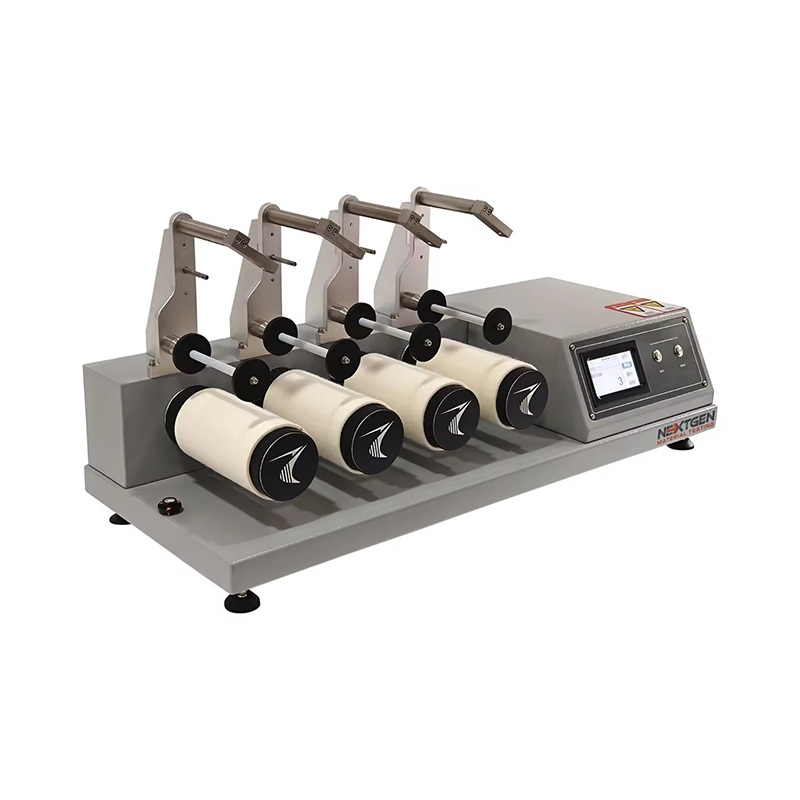
ICI / Mace Snag Tester
Discover the Fabric Textile ICI / Mace Snag Tester, a reliable tool for assessing fabric snagging under normal wear conditions.
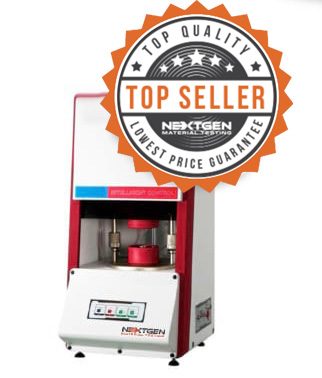
Moving Die Rheometer (MDR)
Introducing the NG-MDR Moving Die Rheometer, your solution for accurately assessing the curing and processing characteristics of vulcanized rubber compounds. Designed for precision, this state-of-the-art rheometer captures the characteristic curve and parameters of rubber vulcanization by measuring the torque applied to the oscillating die.
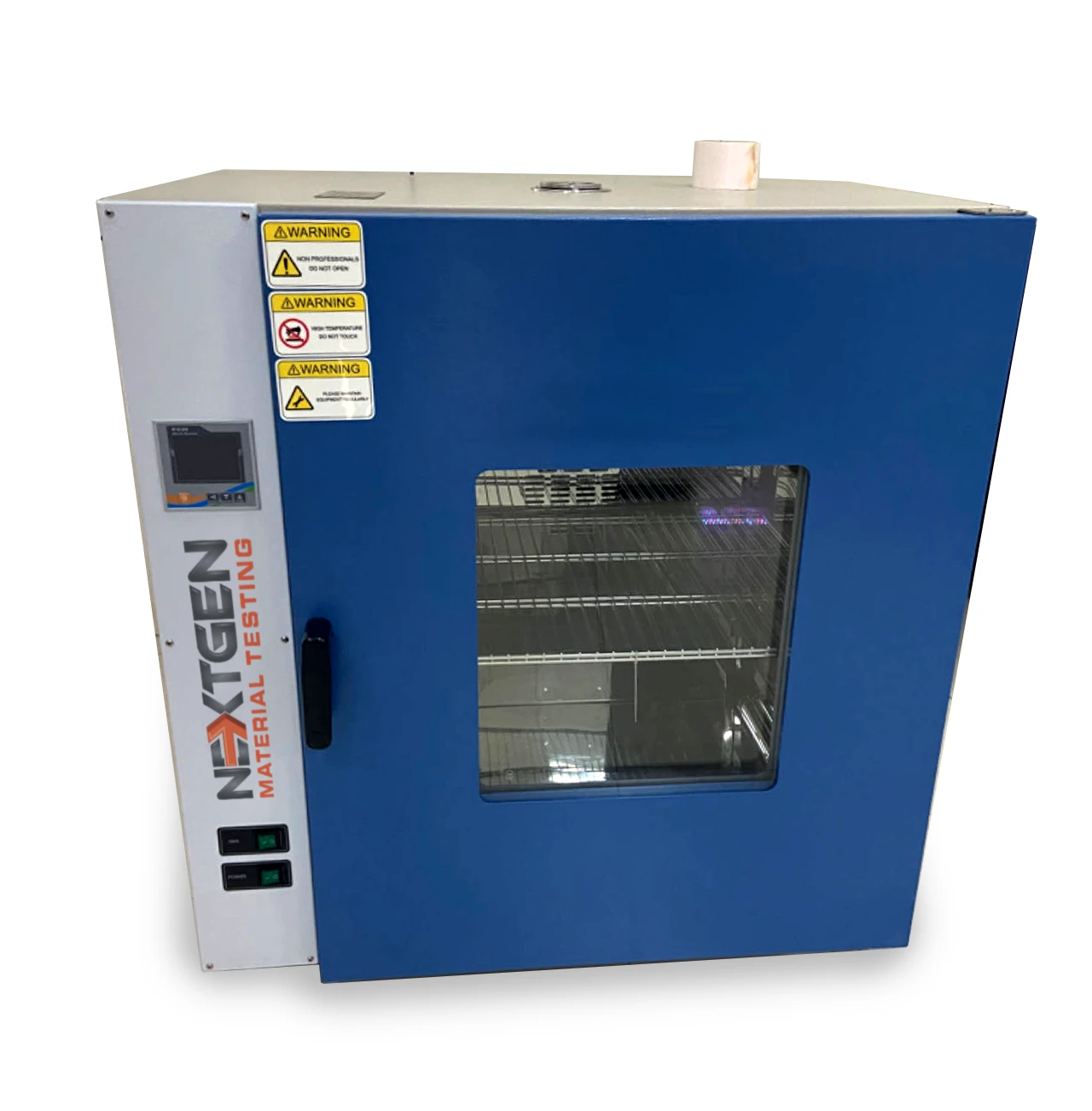
Aging Oven
Our aging oven is well-suited for performing drying, baking, wax melting, and sterilization experiments in industrial and mining enterprises, as well as in laboratories, colleges, and research institutions.
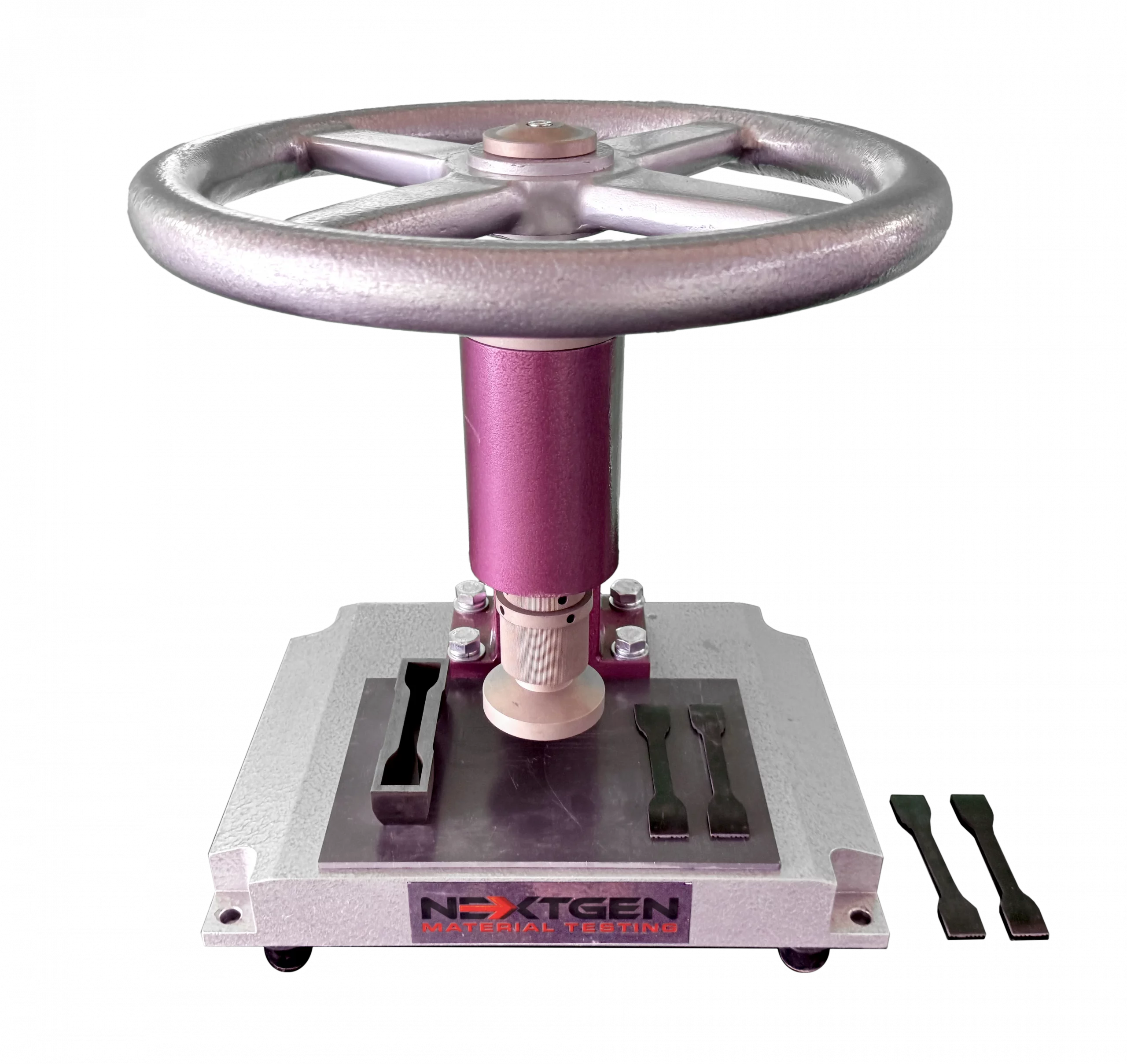
NG-T-Press M Series - Manual Cutting Press System for Rubber Tensile Specimens
Our newest manual cutting press system is suitable for laboratories to create specimens from rubber, tape, and special materials.
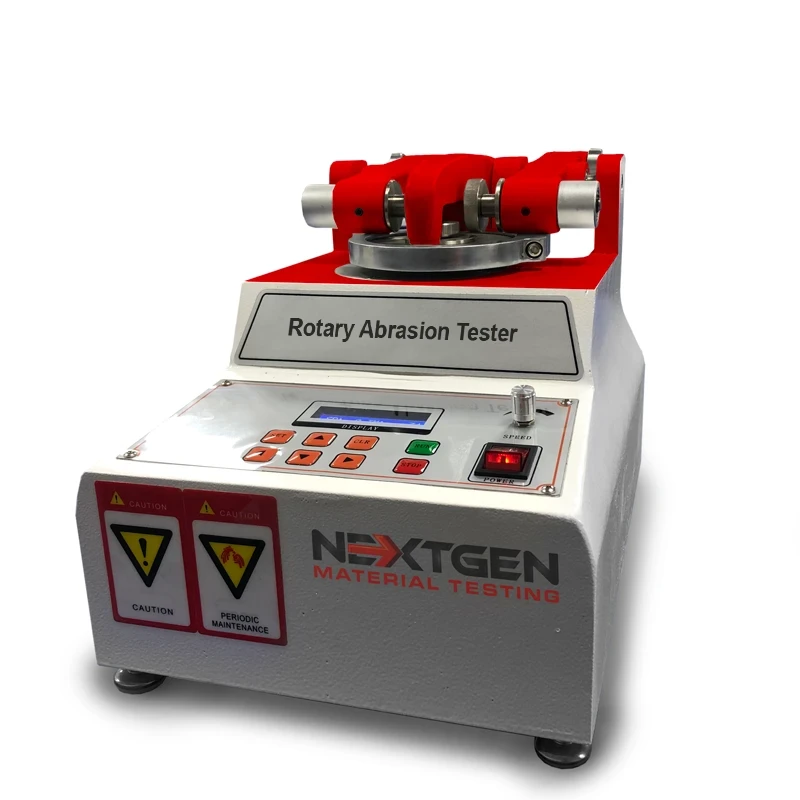
Rotary Abrasion Tester Single & Dual Wheel
GenRotary used evaluate abrasion resistance. It can conduct tests on a wide range of materials such as: cloth, paper, paint, plywood, leather, tile, glass, rubber etc. It tests the specimen by rotating it while in contact with the grinding wheel and applying the required pressure. The Joss of weight reflects on the change in weight of the specimen. The unit also has an intelligent power failure recovery function.
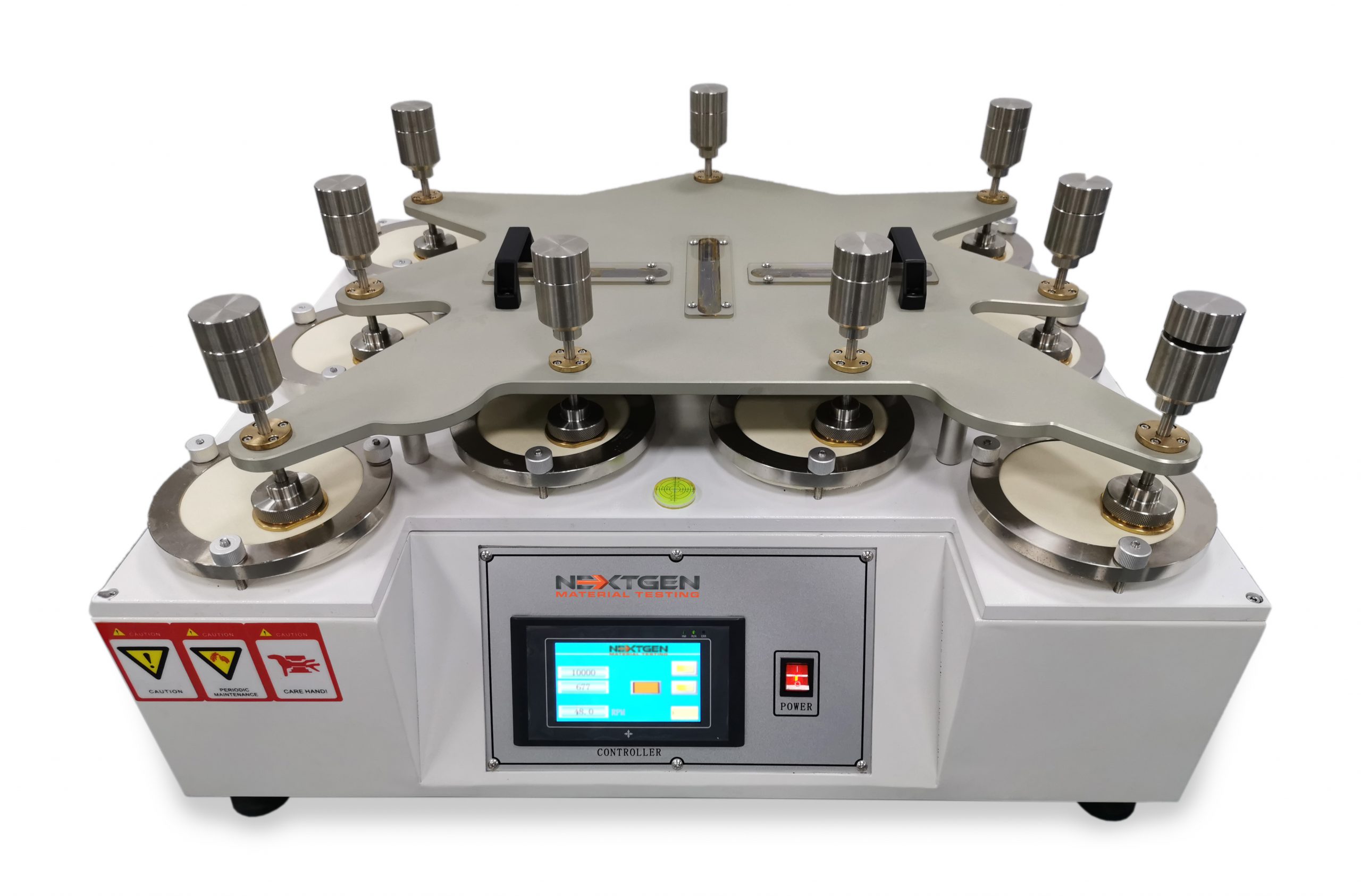
9-Station Martindale Abrasion Tester
The GenDale - Martindale Abrasion Tester is mainly used to test shoe fabric, shoe lining, and many other types of shoe related materials.
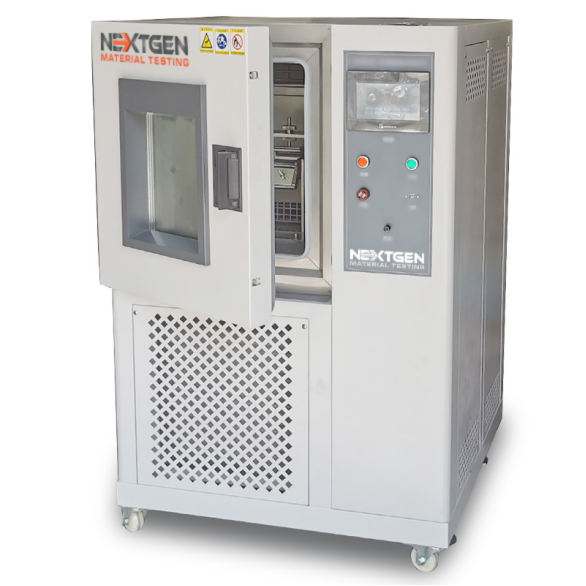
GenRoss-CH - Ross Flex Tester with Low Temperature Chamber
GenRoss-CH is an advanced Ross Flex Tester designed for assessing the cold resistance of materials in low temperature environments.

Linear Taber Abrasion Tester
NextGen's linear abrasion meters evaluate the abrasion and scratch resistance of products, along with color transmission.
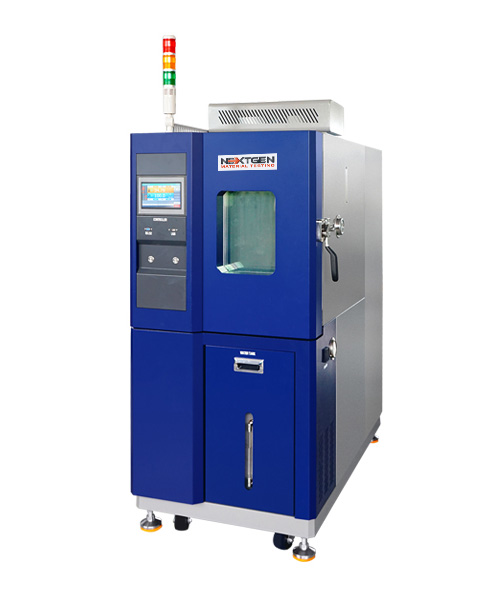
NextGen Environmental Chambers NG-EC 100,150,225,408,1000
The temperature and humidity NextGen Environmental Chambers features a sturdy cabinet made of cold-rolled steel and stainless steel.
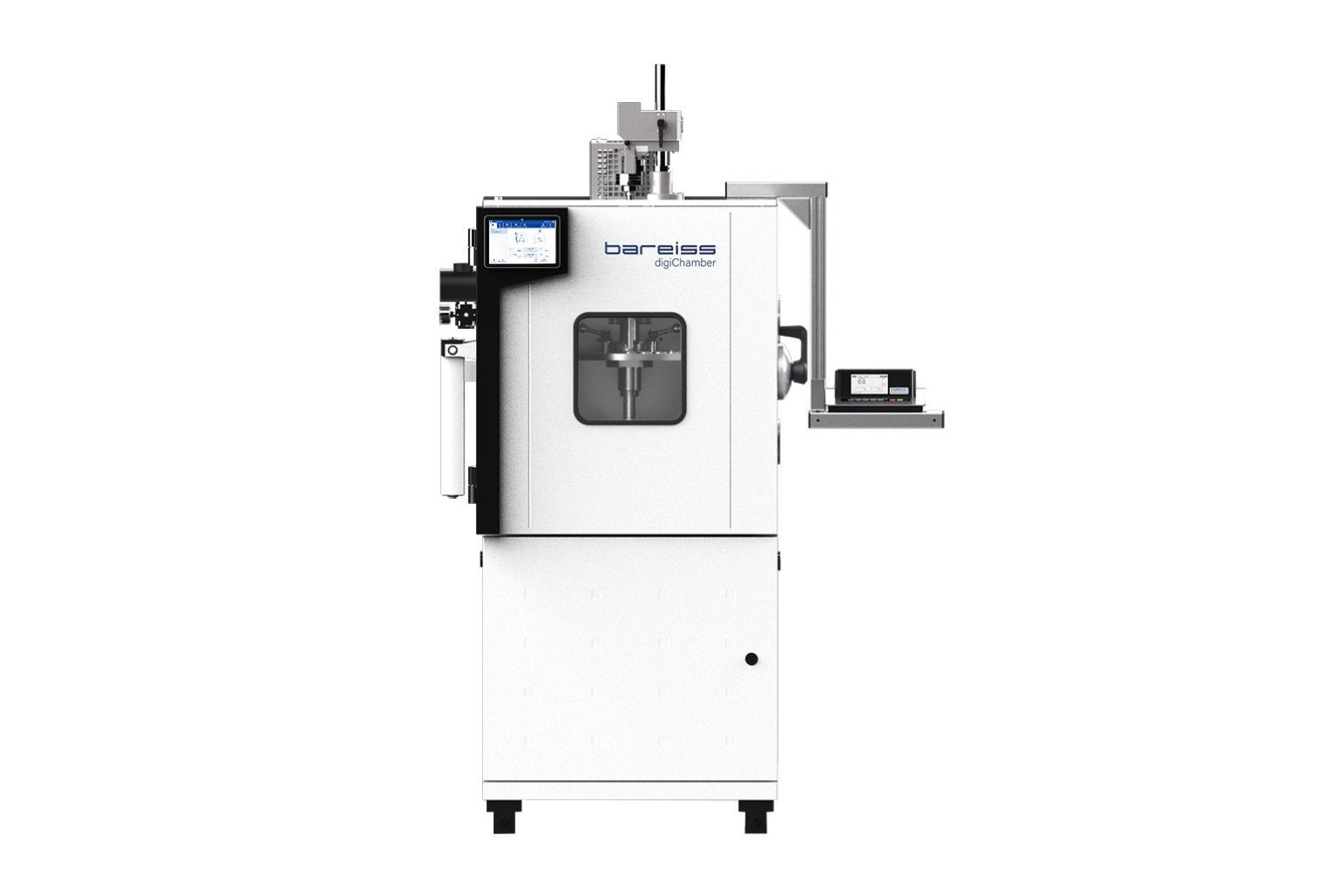
digiChamber - Temperature Controlled Hardness Testing
Discover digiChamber from NextGen Material Testing, the advanced temperature-controlled hardness tester developed by Bareiss.
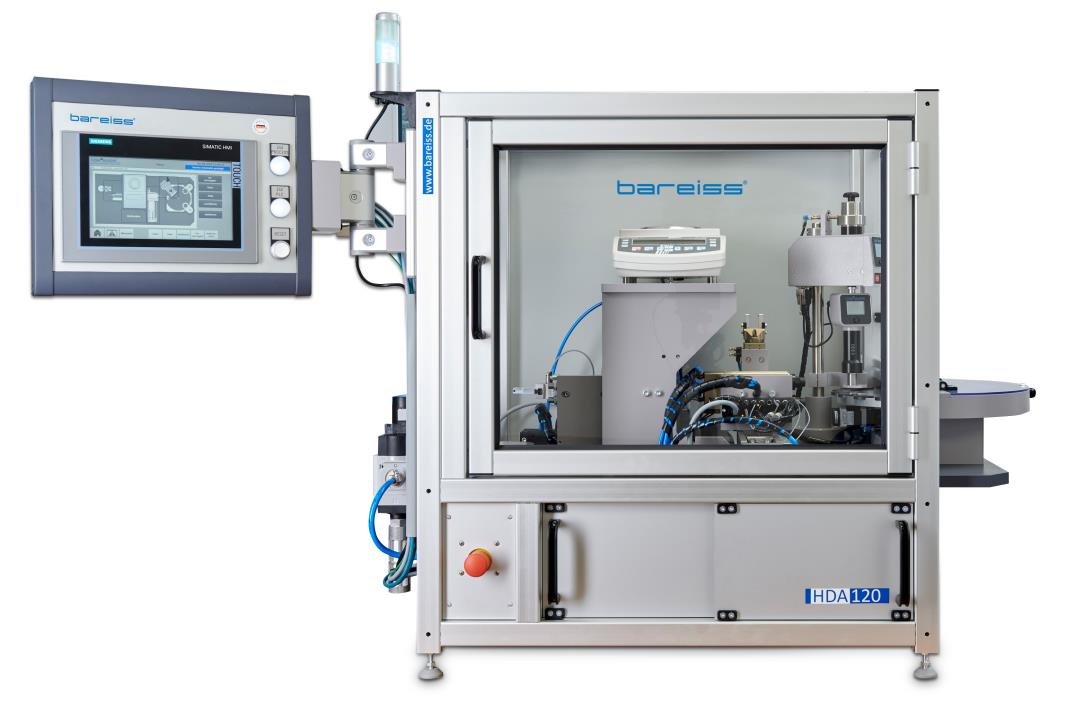
HDA 120 - Hardness and Density Automation Test System
The HDA 120 test system is a versatile solution for semi-automatic detection of sample hardness and density.
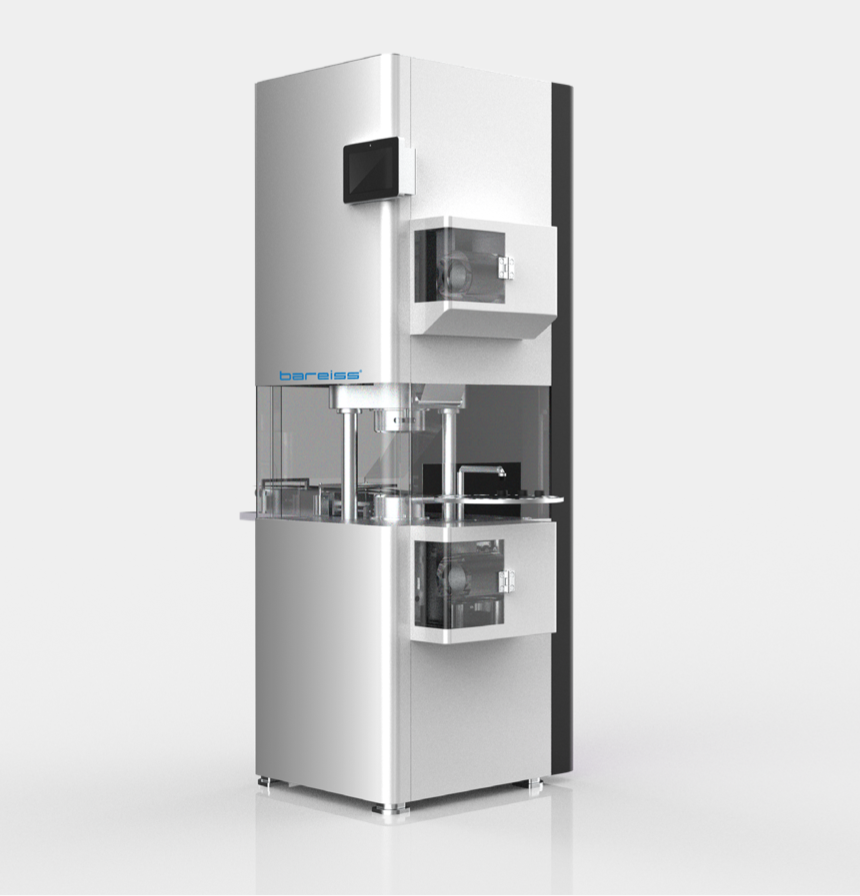
RPA Ultra - Advanced Rubber Process Analyzer Rheometer
RPA Ultra is an advanced rubber process analyzer rheometer that measures the dynamic and static characteristics of raw rubber compounds
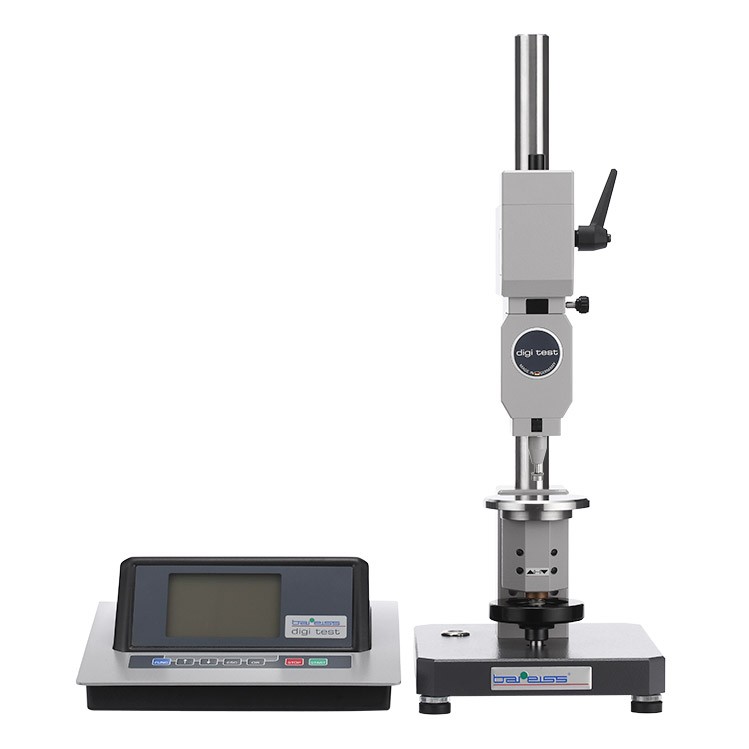
Automatic Shore, IRHD and VLRH Hardness Testing System
NextGen is proud to present our German line of fully-automatic Shore, IRHD and VLRH hardness testing system for plastic materials, plastic and foam compounds for the ultimate precision, accuracy and repeatability, exceptional ease-of-use and maintenance. Experience the industry leader for specimen testing including rubbers, plastics, foams, composites, o-rings, and more.
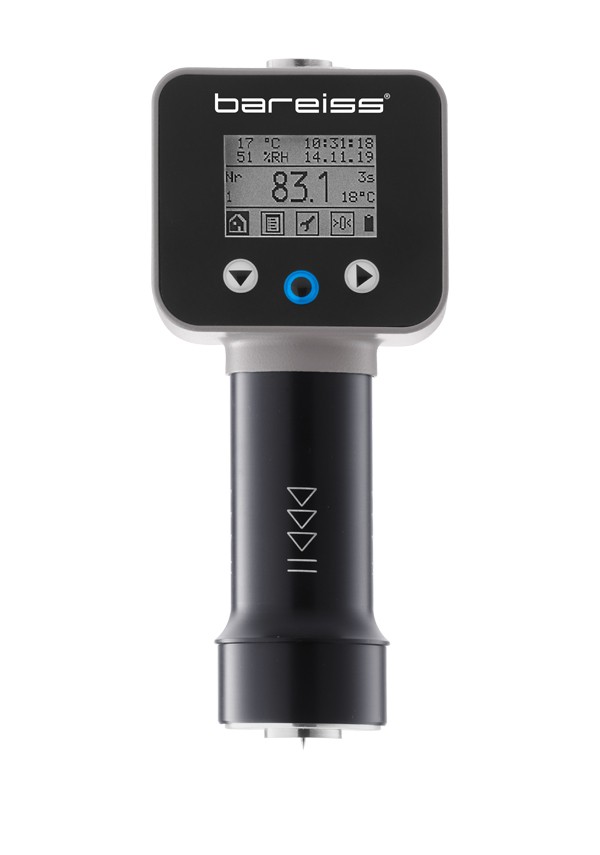
Advanced Portable Shore Durometer System with Test Stand Options
HPEIII is NextGen's advanced German line of equipment that is the new generation of HPE systems ideal for various plastic and plastic compound testing. The new system enhancements offer advantages including temperature sensor, reading values of ambient temperature and humidity, historical hardness value display, larger LCD display, standard USB connection and much more. These advanced portable systems can be paired up with either manual or automatic motorized test stands to help eliminate the human error factor and maximize accuracy and repeatability between test when switching from one operator to the next.
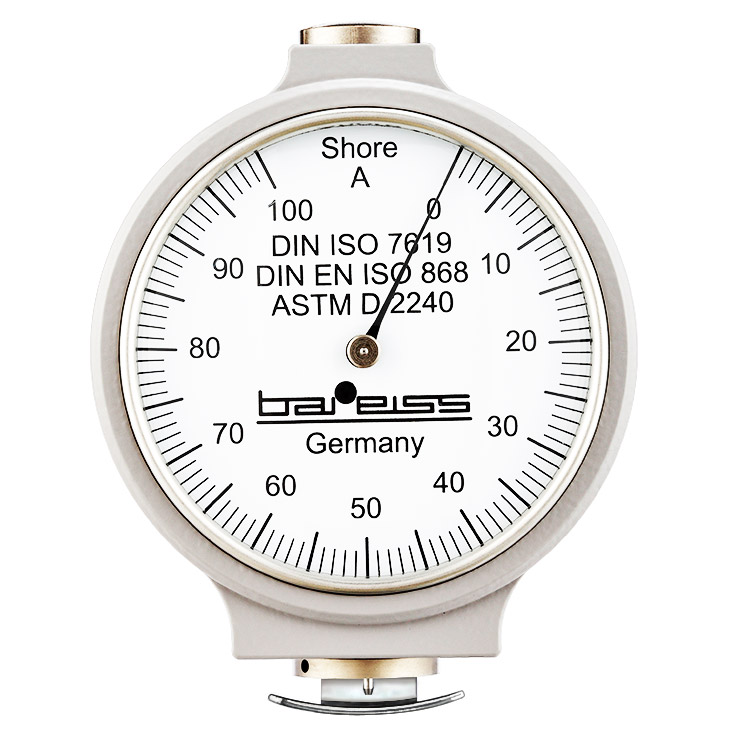
Classic Analogue Shore Durometer with Test Stand Options
This German-manufactured system has been the global benchmark of Shore hardness testing systems since 1954. With ever enhanced ergonomic design, the HP Shore Hardness Tester is both visually appealing and precise rubber and plastic testing system as it has been for nearly 50 years.
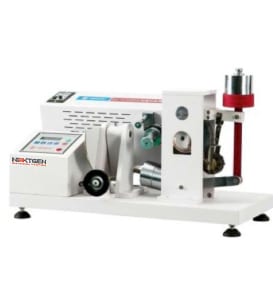
Akron Abrasion Tester
GenKron is used together with a special balance for testing the abrasive consumption of materials. The measurements are done through volumetric loss of a rotating specimen exposed to the action of a standard grinding wheel. It is especially suited for testing harder materials such as shoe soles, tires and other rubber materials.
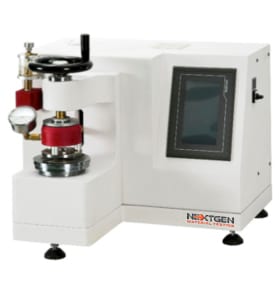
Burst Strength Tester for Fabric
GenBurst is the Burst Strength Tester designed to test anti-rupture strength of variety of materials such as leather, paper and fabric.
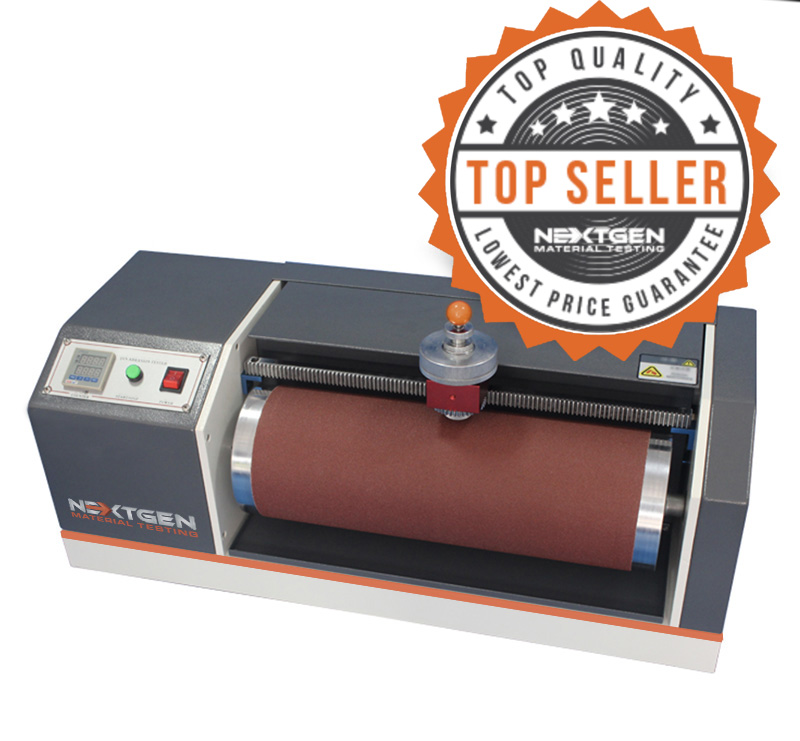
DIN Abrasion Tester
GenDin, is designed to conform to the ASTM D5963 and IS0 4649 standards. This top quality and highly popular abrasion tester will allow you to measure the abrasion resistance of rubbers (vulcanized thermo set rubbers and thermoplastic elastomers) that are subject to abrasive/frictional wear on their actual service. Since wear is always a result of abrasion, different test methods have been developed for the simulation of long term wear.
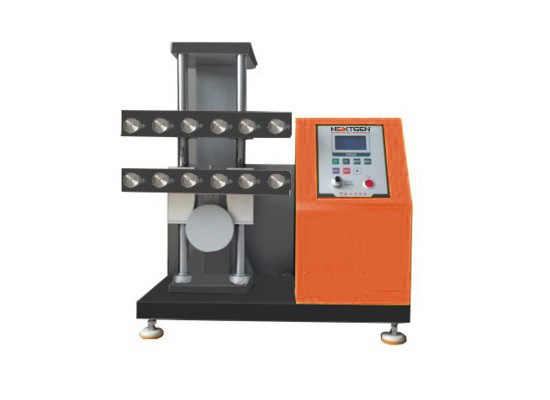
Demattia Flex Cracking Tester
GenFlex tests the ability of rubber products to withstand repeated flexing without developing cracks is of prime importance where such products are used in conditions undergoing repeated flexing. Flexing endurance of rubber products is determined by simulating in laboratory the action of flexing repeatedly under standard conditions of speed, mode, and degree of flexing.
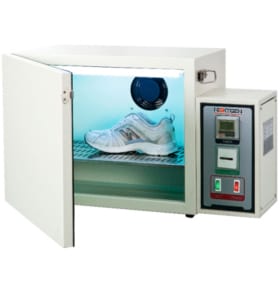
Discoloration Meter
The machine is used to simulate an environment of sunlight radiation on a specimen to identify the resistance of fabric to discoloration.
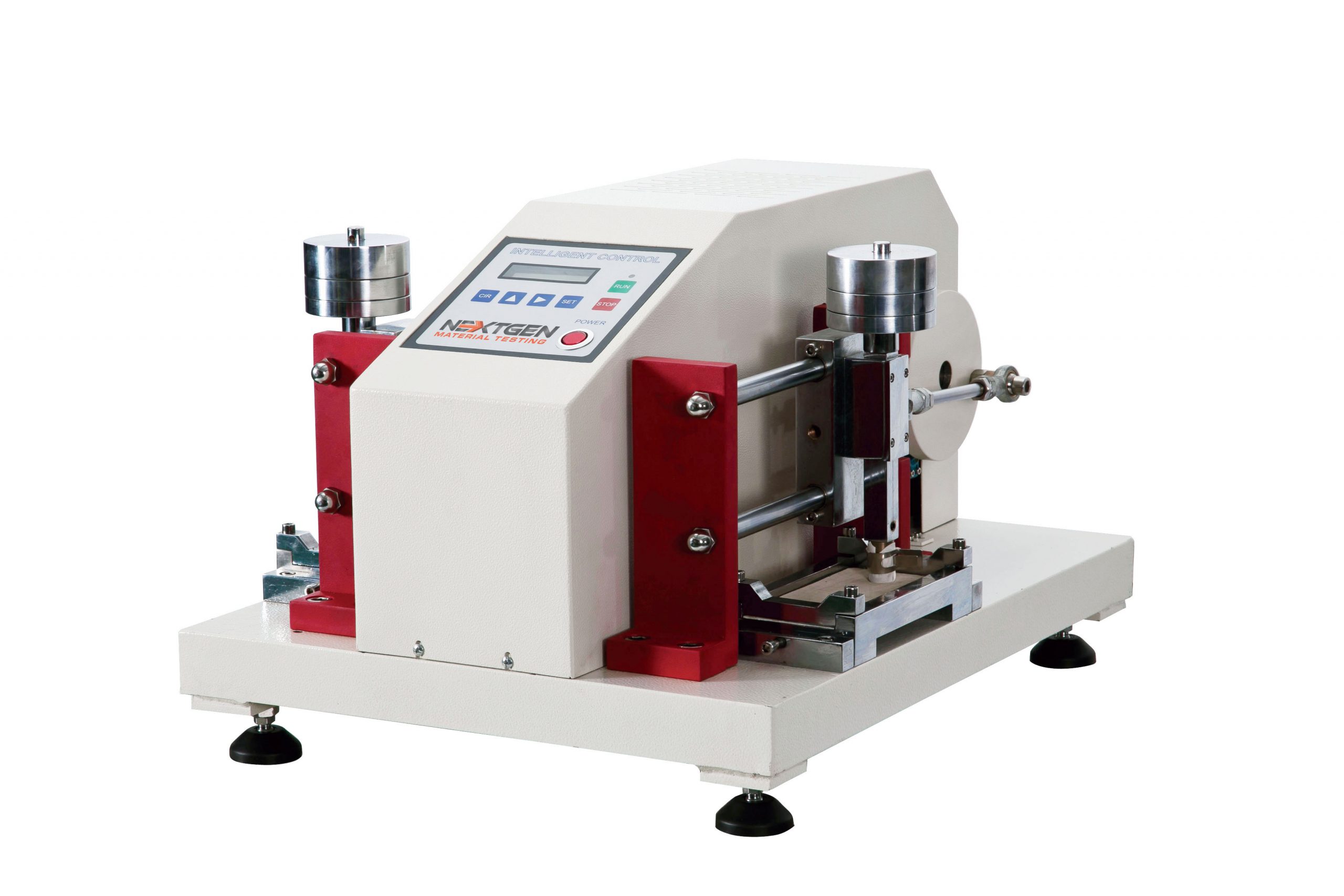
Electric Crocking Tester - GenCrock
The machine is used to test the dyeing of the fabric, and the fade degree of the leather after dry or wet rubbing. The test method involves the specimen to be fastened to the base of the crocking meter and rubbed with an abrasive hammer attached to a wet or a dry cloth under controlled conditions. The transfer of colour is then measured using a scale to evaluate the rating of the specimen's dyeing grade.
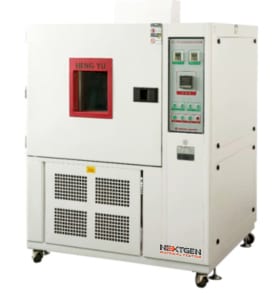
Freezing Tester - GenFreeze
GenFreeze is specially designed to test the characteristics of various materials in a cold environment to ensure suitability for use in a cold climate. Based on the testing demand, adjust the beater and flexing grip, then load to the desired position. It can be used to test rubbers, leather, and plastics, PU leather etc. The unit can be adjusted to meet different requirements.
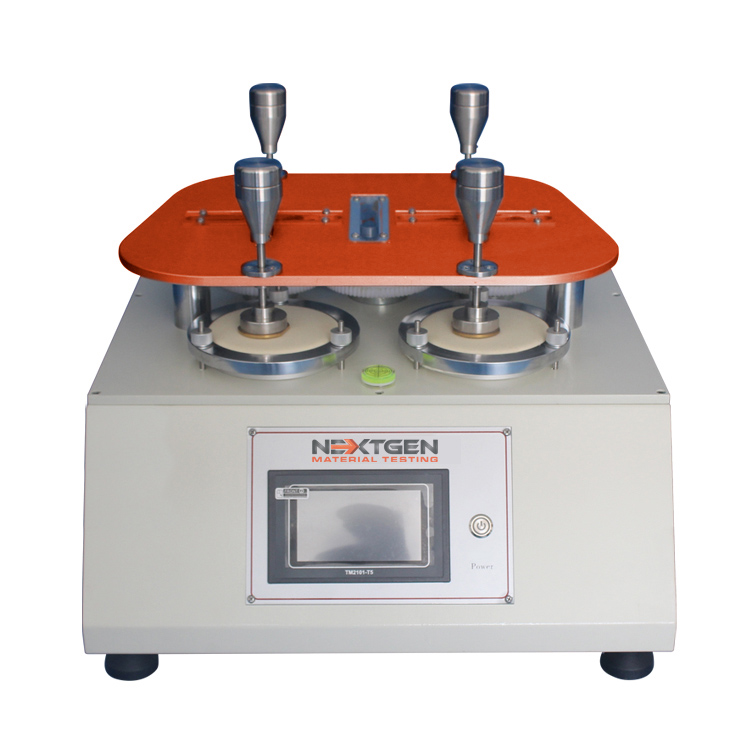
Martindale Abrasion Tester - GenDale
GenDale is mainly used to test shoe fabric, shoe lining, and many other types of shoe related materials. The unit can test up to four specimens at the same time for abrasion. The fabric specimen is measured by having rubbing applied on it via a complex direction of back and forth motion. The accuracy of abrasion strength is determined by the specific number of cycles conducted until a hole appears in the test area of the fabric specimen.
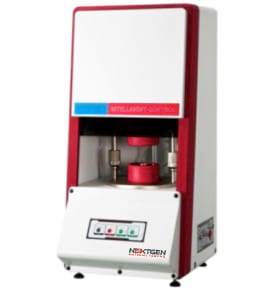
Mooney Viscosity Testing Machine - GenMooney
GenMooney is a viscosity testing machine is applied to measure the viscosity of the unmixed or mixed unvulcanized natural rubber, synthetic rubber and regenerated rubber .This tester has many functions such as fast warming, maintaining temperature, data stability, etc. It is equipped with an automated calibration feature for a simple data calibration of each experiment.
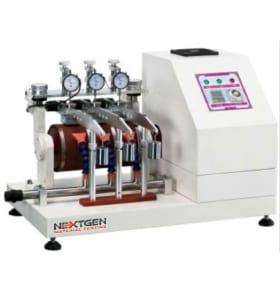
NBS Rubber Abrasion Tester - GenNBS
GenNBS is used to test the abrasion resistance of vulcanized rubber or other rubber compounds. It is commonly used for the soles and heels of footwear. It has an intelligent power failure recovery system. The unit conducts measurements through volumetric loss of specimens exposed to the action of a normalized abrasive medium secured to a rotations cylinder.
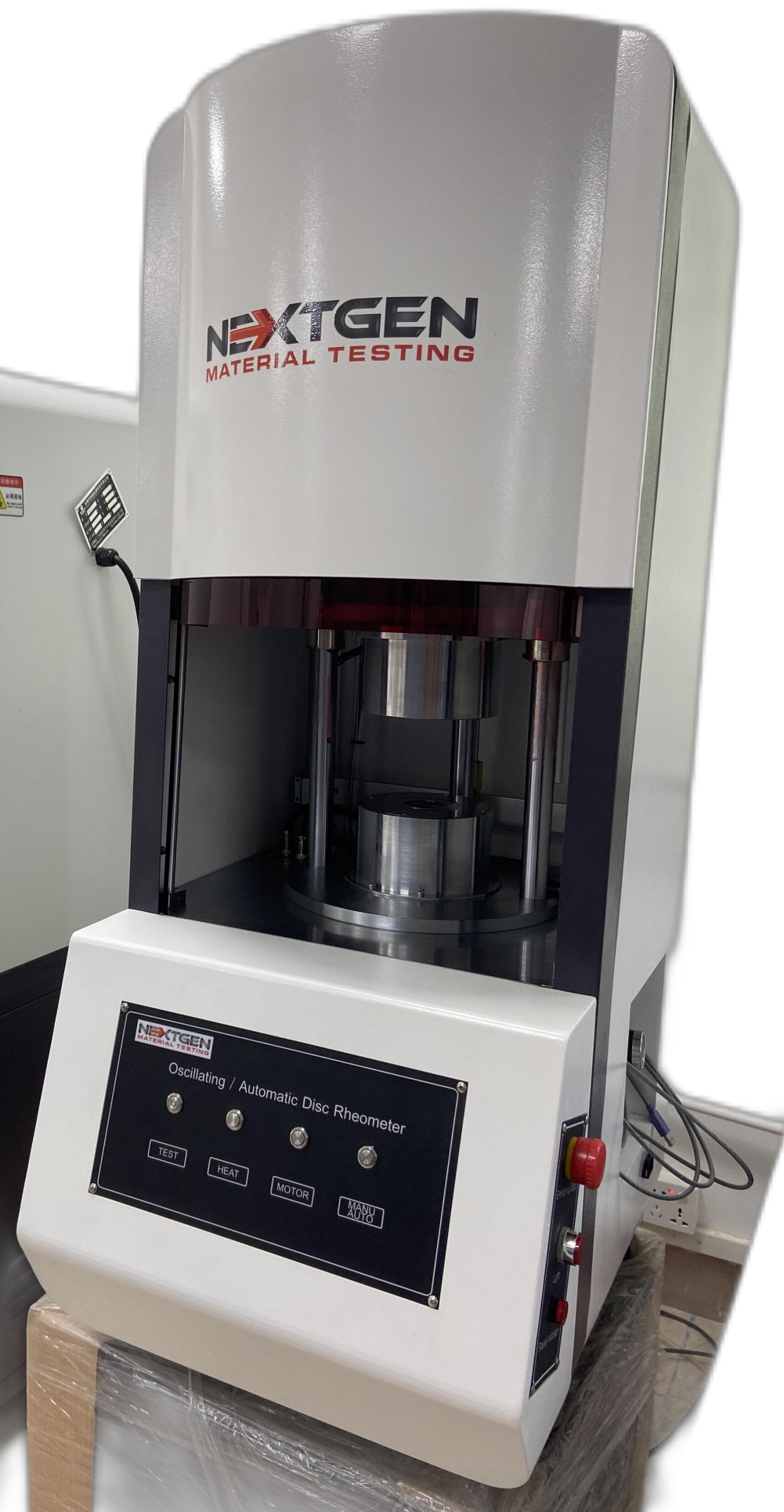
Oscillating / Automatic Disc Rheometer (ODR)
This machine is designed to get the characteristic curve and characteristic parameters of rubber vulcanization by measuring the applied moment of rubber to the oscillating dye body. NG-ODR rotor-free vulcameter has an excellent stability of results. The data and diagrams can be used as a reference for development, research and production quality.
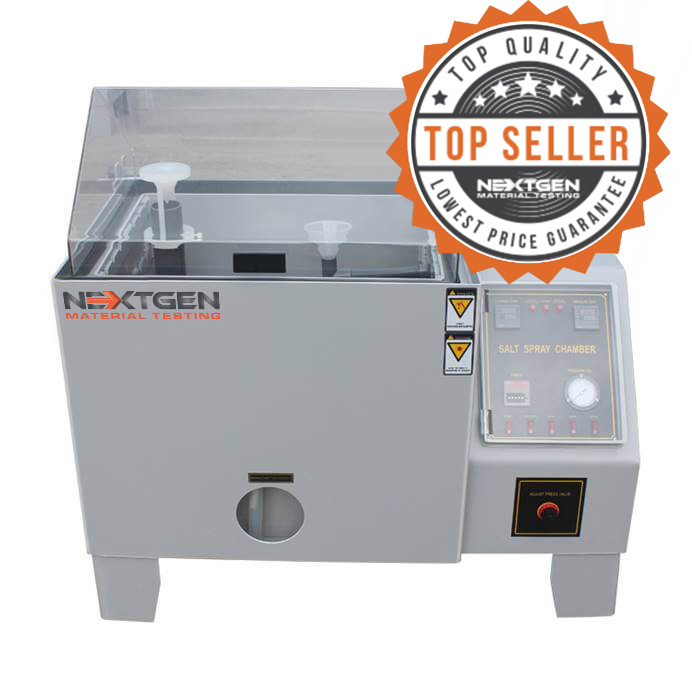
Salt Spray Tester - GenSalt
GenSalt is designed to test the surface of different materials for resistance to corrosion. The unit is commonly used to test coated materials of a metallic nature in a controlled corrosive environment. The test can be used on rust-proof painting, anodizing, electroplating and rust-proof of grease. The machine imitates expedited corrosion process via salt spraying on a given test sample to identify the corrosion (oxides) resistance. Test results are based on the longevity of time a material can resist visible corrosion on the test sample.
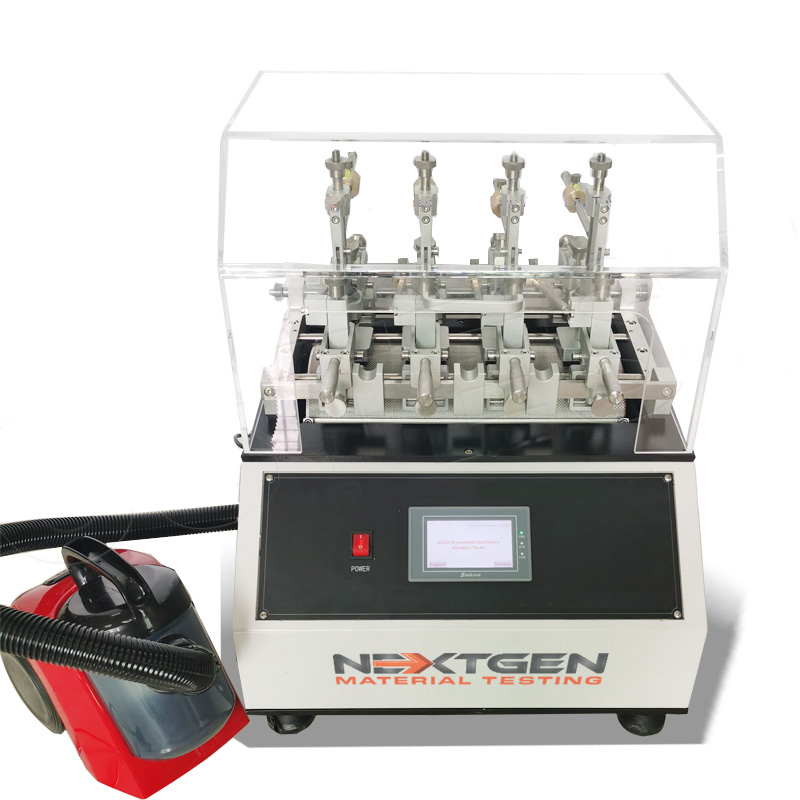
Wyzenbeek Abrasion Tester - GenWyze
The machine is designed to test the abrasion resistance of fabrics and metals. The abrasion of fabrics is tested when the specimen is pulled over the frame and rubbed against an abradant over a curved surface. The number of cycles, also known as double rubs, conducted on the specimen before the fabric shows visible wear is used to determine the rating of abrasion.

Vertical Rebound Resilience Tester - GenRebound
GenRebound tests the resilience of rubber compounds. The machine must be adjusted in a horizontal position and the plunger raised at a specific height. The plunger is then released onto the specimen for a given number of impacts. The measurements are based on the 4th, 5th, and 6th impacts. The average of the three (3) measurements is then calculated for the test result. The machine is highly useful in production of compounds designed to absorb vibration or shock according to the ASTM standards.
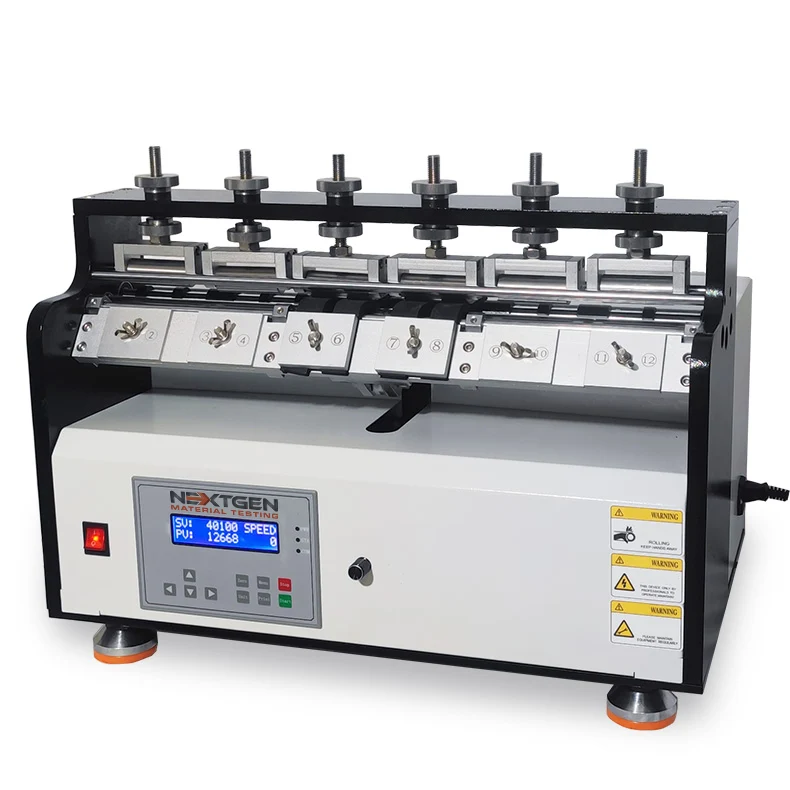
Ross Flex Tester
Ross Flex Tester is designed to determine the resistance of vulcanized or synthetic elastomers to cut growth. The system does so under continuously bend flexing in 90°.
